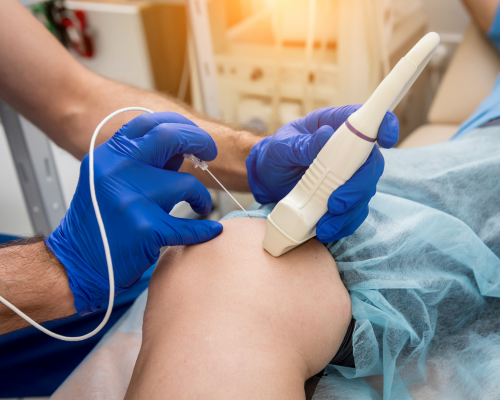Thyroid Ablation
What is Thyroid Ablation?
Thyroid ablation is a minimally invasive treatment option designed to manage thyroid nodules, hyperthyroidism, and certain types of thyroid cancer. The procedure uses advanced imaging to target and destroy abnormal thyroid tissue, helping to shrink nodules, reduce hormone production, or eliminate cancerous cells, depending on the underlying condition.
Thyroid ablation offers an effective alternative to traditional surgery, providing patients with quicker recovery times and fewer complications. It’s typically used when medications aren’t effective, or surgery is not a preferred option.
How Thyroid Ablation Works:
Thyroid ablation is typically performed using one of two methods:
Radiofrequency Ablation (RFA): This technique uses heat generated by radiofrequency energy to destroy targeted thyroid tissue. A thin, needle-like probe is guided to the thyroid nodule or abnormal tissue under ultrasound or CT guidance. Once in position, the probe emits radiofrequency waves, which generate heat to precisely ablate (destroy) the unwanted thyroid tissue.
Ethanol Ablation: In this method, pure alcohol (ethanol) is injected directly into the thyroid nodule or hyperactive thyroid tissue. The alcohol effectively causes the tissue to shrink and eventually die. This is particularly effective for benign thyroid nodules.
Both techniques are minimally invasive, typically requiring only a local anesthetic and sedation, allowing most patients to return to normal activities quickly.
Why Choose Thyroid Ablation?
- Minimally Invasive: Unlike traditional surgery, thyroid ablation requires no large incisions, significantly reducing pain and scarring.
- Outpatient Procedure: Most thyroid ablation treatments are done on an outpatient basis, meaning you can go home the same day with minimal downtime.
- Quicker Recovery: With no large incisions and minimal trauma to surrounding tissue, recovery is fast. Many patients resume normal activities within a day or two.
- Preserves Thyroid Function: In many cases, thyroid ablation preserves the healthy function of the thyroid gland while treating problematic nodules or areas of overactive tissue.
- Effective Alternative to Surgery: For patients who wish to avoid the risks of surgery or who have contraindications to surgery, thyroid ablation offers a highly effective alternative.
Who Should Consider Thyroid Ablation?
Thyroid ablation is a good treatment option for patients who:
- Have benign thyroid nodules: These are non-cancerous growths in the thyroid that may cause discomfort or difficulty swallowing. Ablation can shrink these nodules and reduce symptoms.
- Suffer from hyperthyroidism or toxic nodules: Hyperthyroidism occurs when the thyroid produces too much thyroid hormone. Ablation can treat overactive tissue, reducing hormone production and alleviating symptoms like weight loss, palpitations, and fatigue.
- Have small thyroid cancers: For certain types of thyroid cancer, especially in patients who are not candidates for surgery, ablation can be used to destroy cancerous tissue.
- Want to avoid surgery: For patients who want a less invasive approach or those who cannot undergo surgery due to other health concerns, thyroid ablation provides an effective option.
What to Expect During the Procedure:
Thyroid ablation is usually performed under local anesthesia and sedation, which means you’ll be awake but relaxed and comfortable during the procedure. The steps of the procedure typically include:
- Preparation: You will be positioned comfortably, and a local anesthetic will be applied to the treatment area to numb the skin.
- Guiding the Needle: An ultrasound or CT scan is used to guide the ablation probe to the targeted thyroid tissue. This ensures precise placement of the needle and minimizes the risk of damage to surrounding structures.
- Ablation: Once the probe is in place, the procedure begins. Depending on the method, radiofrequency energy or ethanol will be used to ablate (destroy) the tissue, which typically takes 20-60 minutes.
- Post-Procedure Monitoring: After the procedure, you’ll be monitored for a short time to ensure there are no immediate complications. Most patients are able to go home the same day.
Recovery After Thyroid Ablation:
Thyroid ablation is generally well-tolerated, and recovery is quick. Most patients experience minimal discomfort, which can be managed with over-the-counter pain relievers. You may experience mild swelling or bruising in the treatment area, but this typically resolves within a few days.
You may notice some improvement in symptoms, such as reduced size of thyroid nodules or reduced hyperthyroid symptoms, within a few weeks. Complete results may take several months as the treated tissue gradually shrinks and is absorbed by the body.
Benefits of Thyroid Ablation:
- Minimally invasive with no large incisions or stitches
- Quick recovery with minimal downtime
- Can treat both benign and malignant thyroid conditions
- Effective for reducing symptoms caused by thyroid nodules or overactive thyroid tissue
- Outpatient procedure, no overnight stay required
Is Thyroid Ablation Right for You?
If you have thyroid nodules, hyperthyroidism, or certain types of thyroid cancer and are looking for a less invasive treatment option, thyroid ablation may be the solution. Our team of experienced vascular specialists will assess your condition and discuss whether ablation is the right choice for your thyroid health.

Our Services
- Varicose Veins
- Deep Vein Thrombosis
- Vascular Malformation
- Aortic Aneurysms
- Mesenteric Vasculature
- Acute Limb Ischemia
- Peripheral Arterial Disease
- Stroke Prevention
- Angiography
- Vascular Access for Chemotherapy
- Spider Veins
- Glue Therapy
- Sclerotherapy
- AV Fistula
- Uterine Fibroid Embolisation
- Varicocele Embolisation
- Thyroid Ablation
- TACE
- Prostatic Artery Embolisation
- Varicocele Embolisation
